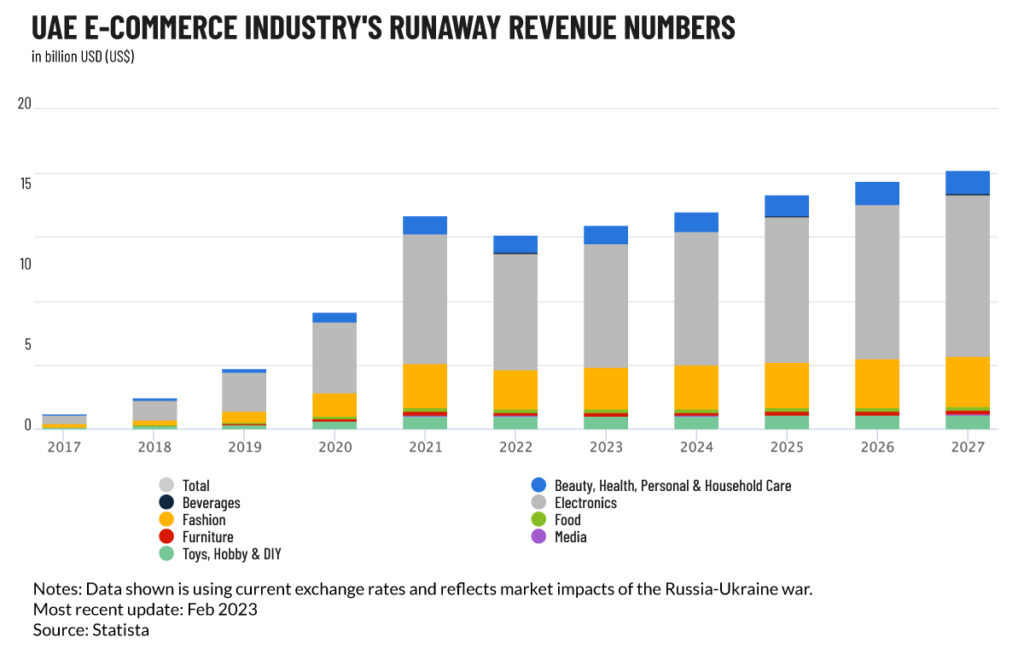Words by Faisal Poonawalla
Reading the tea leaves about the future of e-commerce in Dubai reveals some interesting possibilities
The advent of e-commerce has dramatically reshaped the landscape of the global retail market, offering huge potential for incumbent and newly arrived industry players to tap into. There are multiple growth drivers in the Middle East, especially in the Gulf region, such as a projected Average Revenue Per User (ARPU) of US$1,938.00, and highly developed transport networks, and the burgeoning ranks of a tech-savvy population. Consequently, the ecommerce growth rate in the UAE and the Middle East region has been significant in recent years and is expected to continue growing in the future, growing at a Compound Annual Growth Rate (CAGR) of over 20% between 2020 and 2025.
Interestingly, mobile commerce is expected to play a significant role in the growth of ecommerce in the region, with the increasing number of internet users and the growing demand for online shopping driving the growth of ecommerce in the region. From a policy perspective as well, an array of favourable measures have been put in place by the UAE and other countries in the region to boost the growth of e-commerce, such as tax incentives and investment in infrastructure. This has paid off, with increased investment in e-commerce from a number of local and international companies in the sector.
Dubai: An e-commerce hub
Dubai, with its thriving economy and innovative spirit setting the stage for a bright future in online retail, is quickly becoming a hub for e-commerce. The factors driving the Dubai success story make for interesting viewing, with the city poised for significant growth in this field, with its favorable business climate, highly developed infrastructure, and large, tech-savvy populace. Dubai’s e-commerce market has a huge potential for growth, and I’m confident that it will only continue to expand in the coming years. The city is home to a large number of young, tech-savvy consumers who are increasingly turning to online shopping for convenience and a wider range of products.
My own role in e-commerce is centered around my e-commerce site, www.byft.store, and my latest venture in fulfilment services. By providing end-to-end solutions for online retailers, we help them streamline their operations and reach a larger customer base. With a focus on delivering fast, reliable, and cost-effective services, Byft is playing a vital role in supporting the growth of e-commerce in Dubai. My ambition is to help online retailers in Dubai reach their full potential, and I believe that fulfilment services are key to achieving this. By providing top-notch logistics and support services, I aim to create a thriving e-commerce ecosystem that benefits everyone involved.
Delivering exceptional experiences
By proactively engage customers and end-consumers to create seamless, personalised experiences, leaders and organisations can create exceptional experiences that engage and delight.
Here, in a nutshell, is my playbook for success:
Data-driven approach: Collect and analyse customer data from various sources to gain insights into their preferences and behavior. This information can be used to create personalised experiences that are unique and consistent across all touchpoints.
Omnichannel strategy: Develop an omnichannel strategy that integrates all customer touchpoints, such as online, in-store, and mobile, to provide a seamless experience across all channels.
Personalisation technology: Implement personalisation technology, such as AI and machine learning, to automate and scale personalisation efforts.
Employee training: Train employees to understand the importance of personalisation and how to deliver personalised experiences to customers.
Cross-department collaboration: Encourage collaboration across departments, such as marketing, sales, and customer service, to ensure a consistent and personalised experience for customers.
Customer feedback: Regularly gather customer feedback to continuously improve the customer experience and ensure it remains personalised and relevant.
By adopting these strategies, leaders and organisations can create unique and consistent customer experiences that are personalised and relevant to each customer’s needs.
Gazing into the future
The future of ecommerce and fulfilment services in Dubai is expected to continue to grow rapidly in the coming years, with some trends and developments expected to shape the industry.
The use of technology such as AI, robotics, and automation will continue to increase in order to improve efficiency and customer experience. As well, we will see an expansion of last-mile delivery. The demand for fast and convenient delivery is expected to increase, leading to a growth in last-mile delivery services. Dubai’s strategic location and strong logistics infrastructure will continue to support the growth of cross-border ecommerce. Companies are expected to adopt more sustainable practices in their fulfilment operations, such as reducing waste and emissions.
The emergence of new fulfilment models, such as subscription-based models and shared warehousing, are expected to emerge in response to changing customer needs. Overall, the future of ecommerce and fulfilment services in Dubai looks promising, with continued growth and innovation in the industry.
Whether you’re an online retailer looking to expand your operations, or a consumer seeking the convenience and variety of online shopping, keep an eye on Byft and the exciting developments taking place in Dubai’s e-commerce market.
Faisal Poonawalla, a serial entrepreneur, consultant, angel investor, and expert in the field of e-commerce, started his career in the early nineties when he joined the family business and in time helped spread its geographical boundaries further. A foodie and cricket enthusiast, he never misses an opportunity to try a new restaurant or cuisine and catch up on a match during his constant travels.



